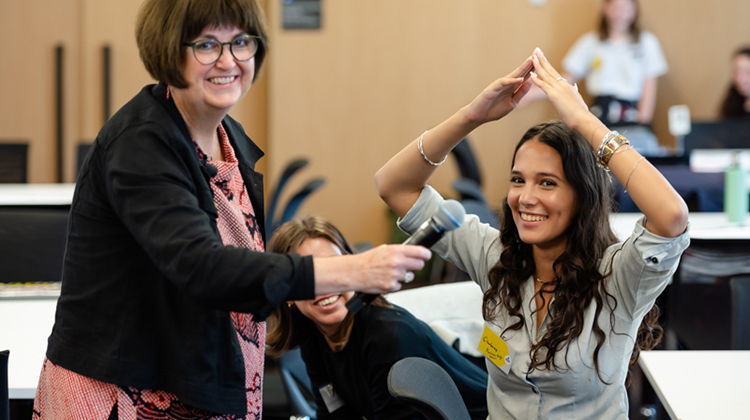Students’ Ideas for a Sustainable Future

A giant fish machine - ‘fully intelligent’ - the shape of a plastic sushi soy sauce bottle trawls the bottom of the ocean, sucking up waste to be recycled into cups and kettles. Buses levitate above our cities, powered by giant magnets, to make room for nature and bike paths below. Aluminium cans are recycled into computers which can then be recycled into solar panels, while cows munch happily on kelp, reducing methane and providing a renewable carbon sink.
Just some of the ideas Victorian secondary students generated at the 2nd Climate Change Education Forum.
The event brought together students and teachers from 14 Victorian secondary schools, and professionals from 27 organisations including government departments and agencies, universities and industry. Participants engaged in intergenerational conversations, learning, and future-focused activities to build confidence and understanding of climate change and climate action.
The forum, facilitated by Sustainability Victoria with the theme ‘Collaboration’, supported the delivery of the Victorian Government’s Education and Training Climate Change Adaptation Action Plan 2022–2026 to prepare learners to understand climate change and its impacts on them and their world. Sustainability Victoria, the Victorian Department of Education and Deakin University’s Centre for Regenerative Futures at Deakin Downtown partner in the program.
The Victorian Curriculum F-10 includes sustainability as a ‘cross curriculum priority’. This means teachers apply sustainability as a lens or a theme across the entire curriculum.
The day involved uplifting and challenging conversations and workshops aimed at providing a space for student voice and a platform for connection and skills exchange between students, industry, teachers and pre-service teachers with policy makers and climate action organisations.
Participants expressed their current concerns around habitat loss, inequity, greed, and that change is too slow. They felt concerned that we don’t have enough time and shared feelings of powerlessness.
“I’ve found this morning really inspiring and really enjoyable, particularly actually hearing what other people have to say and their different perspectives on how we can tackle such a big issue like climate change,” one student participant said.
Phil Guthrie, a teacher at Notre Dame College, Shepparton, agrees that the future-focus was important for engaging and empowering students. “Highlighting the things from our current world that probably won’t be around in 30 years … [Thinking] 'Wow, did we really do that?' Then conversely, to step into the world of 2050 … and look at all the good things that are possible - that was really exciting.”
Pre-service teachers were invited to the forum to connect the observations and themes raised with professional learning opportunities for our future teaching workforce.
“We are always working to improve climate change education in Victoria,” explains Sustainability Victoria’s Education Manager, Cyrelle Field. “Events like this work to increase the confidence of participants to improve climate change education.”
Sustainability Victoria works with schools, government, industry, not for profits, community, and higher education institutions to ensure that Victorian students and teachers have access to best-practice sustainability and climate change education in their schools.
Its ResourceSmart Schools program supports schools to embed sustainability across the school facilities, community and curriculum, while saving resources and money for the school. The program has supported 1,600 Victorian schools to develop their own projects to reduce their energy use and together save more 110,000 tonnes of CO2e greenhouse gas emissions since 2008.